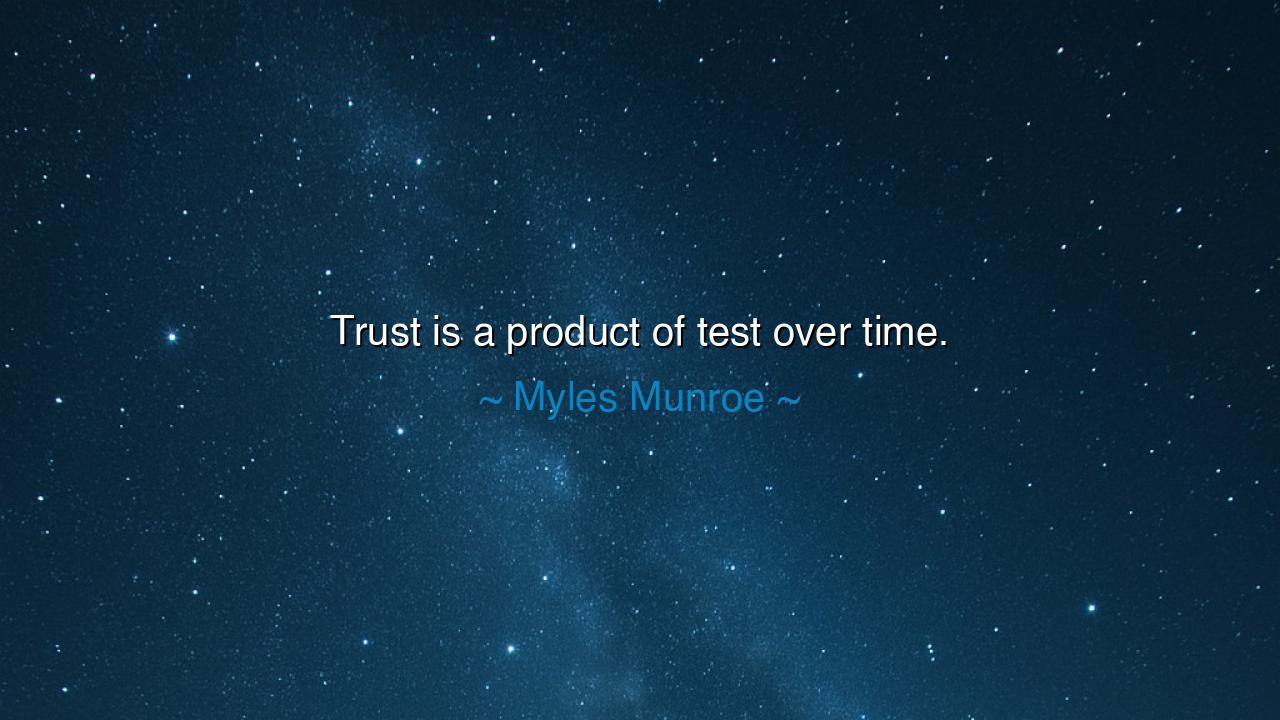
Trust is a product of test over time.






Hear, O seeker of wisdom, the words of Myles Munroe, a teacher of nations and a voice of clarity, who declared: “Trust is a product of test over time.” In this brief saying lies a truth as old as humanity itself: that trust is not given freely as the morning sun rises, but is forged in the crucible of experience, trial, and endurance. It is not born in a single day, nor granted by mere words, but proven by deeds repeated across the passage of time.
What is trust? It is the sacred assurance that another will stand when needed, that their word is bond, that their hand will not fail when your life is placed within it. But such assurance does not come from appearances or promises—it comes only from testing, from seeing the soul tried in moments of challenge, and finding it steadfast. Just as gold is proven pure by fire, so too is trust purified by the fires of circumstance. Without test, trust is mere hope; with test, it becomes certainty.
Consider the story of the Roman legions, whose might was not simply in their swords, but in their trust for one another. Soldiers trained side by side, marched side by side, bled side by side. Over years of trial, they learned that the man on their left would not abandon his shield, that the man on their right would not falter in fear. That trust, tested again and again in battle, made them a wall unbroken by the fiercest enemies. Without such testing, they would have been but a mob; with it, they were an empire’s iron core.
So too in human bonds beyond the battlefield. Think of friendship: many call themselves friends in times of ease, but only those who remain in seasons of storm are proven true. When hardship comes, when wealth is gone, when sickness strikes, it is then that friends are tested. And when they remain, when they endure, trust grows as an oak grows—slowly, silently, but with roots deep enough to withstand the ages.
O children of tomorrow, mark this lesson: do not give your full trust hastily, for what is untested is unproven. Words alone cannot bind; time and trial are the only sure judges. And yet, when you find one who has endured the tests, one who has stood firm through disappointment, adversity, and temptation, then you have found a treasure beyond price. Such trust is not fragile—it is a fortress.
The teaching is twofold: first, understand that trust must be earned; second, understand that you too must be tested to be trusted. If you would have others place their faith in you, then be steadfast in trial, loyal in difficulty, consistent in truth. Do not shrink back when tested, for each test is the fire that refines your reliability and proves your worth.
Practical action is this: be patient in building trust, both with others and with yourself. Allow time to test the character of those around you, and let your own deeds over time prove your integrity. Do not despise the trials that come, for they are the very instruments by which trust is forged. And when you have gained it, guard it fiercely, for trust once broken is harder to mend than shattered glass.
So let the words of Myles Munroe echo in your spirit: “Trust is a product of test over time.” Hold fast to this wisdom, for it will guide you in choosing companions, in leading others, and in shaping your own character. Remember that true trust, once forged, is stronger than iron, more enduring than stone, and more precious than gold.






TVng thi thuy vy
I really like how Munroe points out that trust takes time. It’s not something that can be rushed. But I also wonder—how much time is too much time before trust is tested? How do we know when we’re truly testing someone’s trust and not just doubting them unnecessarily? Sometimes I feel like testing trust too much can actually hurt the relationship instead of strengthening it. How do we find that balance?
MAPham Thi Mai Anh
This quote hits home in a way. It feels like the nature of trust is always evolving based on how much time we invest in testing it. But how do we know when to stop testing and just trust? Is there a point where overanalyzing or overtesting damages the relationship or experience? How do we strike the right balance between testing and allowing trust to grow organically over time?
MTMinh Thu
Myles Munroe’s quote makes me think about how often we place trust in people or institutions without truly allowing time to test their reliability. It’s like we expect trust to be instantaneous, but trust is built through actions, not just words. Is it fair to judge someone’s trustworthiness too quickly, or do we risk missing out on meaningful connections by overtesting or not testing enough?
HTMuoi Ho thi
I really appreciate this perspective on trust. It makes me think of all the situations in life where we expect people to trust us, but don’t necessarily give them enough time or reasons to prove their trustworthiness. Does this mean we should be more patient with others and give them the time to prove themselves? Is it possible to trust someone too quickly, and what consequences does that have in the long run?
PTNgoc Tram Phan Thi
This idea about trust really resonates with me, especially in the context of personal relationships. It’s so true that trust must be tested over time to prove its strength. But does that mean we’re always testing people, even subconsciously? How do we balance giving trust freely with making sure it’s earned over time? Can someone fully trust another if they constantly feel the need to test them?